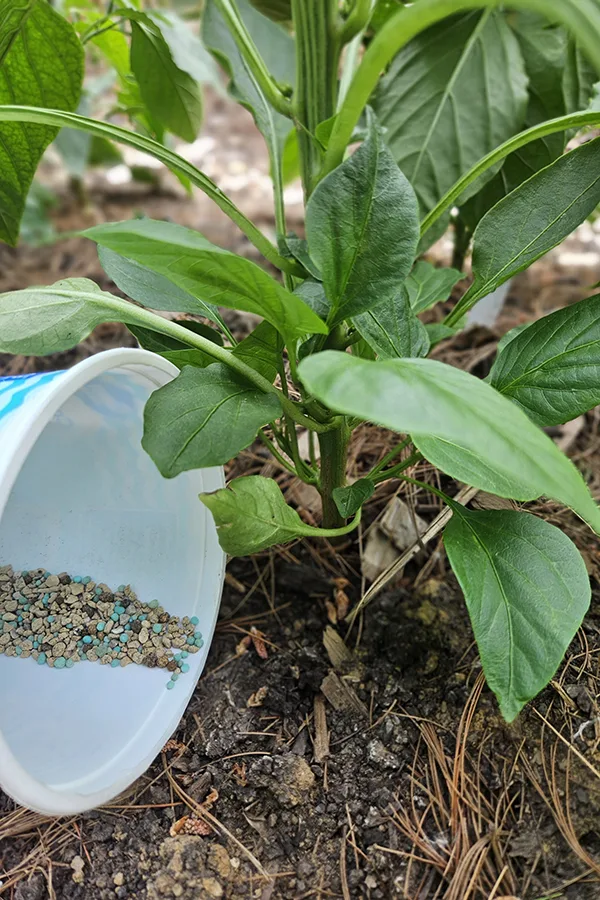Discover the Best Fertilizers for Peppers and Enhance Your Yard's Return
Discover the Best Fertilizers for Peppers and Enhance Your Yard's Return
Blog Article
Organic Vs. Synthetic Fertilizers: Which Is Best for Supporting Healthy Pepper Plants?
In the world of supporting healthy and balanced pepper plants, the selection between artificial and natural plant foods stands as a pivotal choice with significant ramifications. While both options aim to give essential nutrients to sustain plant development, the subtleties of their influence on the dirt, plant health and wellness, and the atmosphere stimulate an argument that mirrors throughout the horticulture area. Recognizing the distinctive benefits and potential pitfalls of each plant food kind is crucial for pepper cultivators seeking to enhance their returns while maintaining a lasting and eco-conscious strategy.
Benefits of Organic Plant Foods
Organic fertilizers offer a lasting and environmentally-friendly method to beneficial pepper plants, offering crucial nutrients without using synthetic chemicals. These natural plant foods are originated from natural sources such as compost, manure, bone meal, and seaweed, promoting soil health and wellness and biodiversity. Unlike artificial fertilizers, natural alternatives release nutrients slowly, ensuring a well balanced and steady supply for pepper plants to prosper.
One significant benefit of natural plant foods is their capability to improve dirt framework and water retention. By boosting dirt health and wellness, natural fertilizers promote advantageous microbial activity, which assists in nutrient uptake by pepper plants. In addition, organic plant foods reduce the danger of chemical run-off, safeguarding water sources from contamination and protecting the setting.
Moreover, natural fertilizers add to long-lasting dirt fertility by advertising the growth of valuable soil microorganisms. These organisms assist damage down raw material, releasing nutrients in a form that is quickly obtainable to pepper plants. best fertilizers for peppers. By cultivating a healthy soil environment, natural plant foods support lasting pepper farming practices that benefit both plants and the environment
Drawbacks of Synthetic Fertilizers
Artificial plant foods, in comparison to their natural equivalents, present different negative aspects when made use of to nourish pepper plants, influencing both plant wellness and ecological sustainability. One significant downside of artificial fertilizers is their propensity to seep nutrients from the soil quickly.
Moreover, the overuse of artificial fertilizers can add to water pollution. Excess plant foods not taken in by plants can remove into water bodies, leading to eutrophication, where algae blooms diminish oxygen levels in the water, damaging marine life. Synthetic fertilizers are typically acquired from non-renewable sources, such as fossil fuels, adding to carbon exhausts and environmental degradation throughout their manufacturing.
Nutrient Absorption Comparison
Efficient nutrient absorption plays an important role in the overall health and growth of pepper plants. When comparing synthetic and natural fertilizers in regards to nutrient absorption, natural fertilizers have the advantage of giving a more balanced and slow-release source of nutrients (best fertilizers for peppers). Organic fertilizers have a selection of macro and micronutrients that are not only helpful for the plants yet also promote healthy soil microbial task, which aids in nutrient uptake. On the various other hand, synthetic fertilizers usually offer a fast launch of nutrients, which can lead to leaching and overflow, causing lower my company nutrient absorption prices by the plants.
Furthermore, natural plant foods improve soil structure and water retention ability, permitting pepper plants to gain access to nutrients a lot more successfully. This enhanced soil high quality promotes origin advancement, allowing much better nutrient absorption. Artificial fertilizers, although at first increasing plant development because of their high nutrient focus, may impede long-lasting nutrient absorption by degrading soil health with time.
Ecological Influence Factors To Consider

On the various other hand, synthetic plant foods, although usually more concentrated and immediately offered to plants, can have harmful results on the atmosphere otherwise applied effectively (best fertilizers for peppers). Their manufacturing requires high power inputs, resulting in greenhouse gas exhausts and contributing to environment modification. Moreover, the drainage of excess synthetic plant foods can pollute water sources, causing eutrophication and harming marine environments.
Finest Plant Food Practices for Peppers
To achieve this, it is crucial to follow finest plant food techniques customized to the specific needs of pepper plants. One important technique is to perform a soil examination prior to applying any fertilizers.
Another essential practice is to fertilize pepper plants at the right time. Generally, peppers take advantage of obtaining plant food at planting and after that once again when they start to blossom. Over-fertilizing can result in nutrient inequalities and hurt the plants, so it is vital to adhere to suggested application rates.
In addition, selecting a balanced plant food with an NPK ratio that fits pepper plants' needs is fundamental. Organic plant foods, such as compost or manure, can be excellent selections as they launch nutrients gradually and improve soil framework with time. Nonetheless, artificial plant foods can supply a quick nutrient increase when required. Ultimately, incorporating natural and synthetic fertilizers sensibly can assist nurture healthy and balanced pepper plants while lessening environmental influence.
Final Thought

Organic fertilizers supply an environmentally-friendly and lasting approach to nourishing pepper plants, supplying essential nutrients without the use of artificial chemicals. Unlike artificial fertilizers, organic choices launch nutrients gradually, ensuring a well balanced and steady supply for pepper plants to flourish.
Synthetic plant foods, in comparison to their natural equivalents, pose various downsides when made use of to nurture pepper plants, influencing both plant health and environmental read the full info here sustainability. When comparing organic and synthetic fertilizers in terms of nutrient absorption, organic fertilizers have the advantage of supplying an extra well balanced and slow-release resource of nutrients.In addition, natural plant foods boost soil structure and water retention capacity, allowing pepper plants to access nutrients a lot more effectively.
Report this page